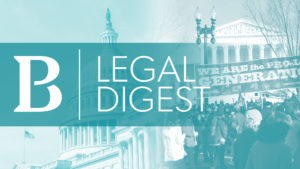
NASHVILLE, Tenn. (BP)–Can the Southern Baptist Convention’s participation in a boycott of The Disney Company be defended from a theological perspective?
Yes, it can, according to an essay in the October issue of SBC LIFE, the monthly publication of the SBC Executive Committee.
Written by associate editor John Revell, the essay, “Confronting Cultural Darkness,” begins by citing several theological objections raised by critics of the SBC resolution urging a boycott of the Disney entertainment conglomerate, adopted by messengers to the SBC annual meeting in June in Dallas:
The objections, as quoted by Revell from various sources:
— “… real life change and transformation come from the Holy Spirit, not through external coercion of political and economic maneuvering.”
— “Nowhere, based on God’s Word, do I see where Christians, in the name of Jesus, are to forcibly try to change the culture of society.”
— “In its earliest days, the church had no power to change society through boycotts or other political actions.”
Revell’s essay is divided into several sections responding to the objections, including:
— an overview of God’s “moral and civil expectations of all cultures and societies,” citing the examples of Sodom, Canaan, Assyria and Babylon from the Old Testament.
— an overview of “godly influences on secular societies in the Old Testament,” citing the examples of Joseph, Jonah, Daniel, Shadrach, Meshack, Abednigo, Esther and Nehemiah from the Old Testament.
— an overview of New Testament teachings on Christians as “salt and light” to the world, the preaching of repentance and the call of 2 Timothy 4 to “reprove, rebuke and exhort” (v. 1-2).
— an overview of the influences of John the Baptist and the Apostle Paul on secular society.
In his conclusion, Revell notes:
“The Bible teaches through command and example that God’s people, when given the opportunity, have a responsibility to confront the sins of their society. This is not done in lieu of preaching the Gospel, but in tandem with it. Within our own culture, whether the issue is immoral products and practices by a company, or immoral policies by a government, there is ample evidence to support the Christian’s responsibility to verbally address those sins, and when appropriate and possible, to take biblically consistent steps to stem the flow of cultural immorality. In the free-market democratic society of the U.S., a peaceful boycott of enterprises that oppose God’s societal standards fits within these parameters.
“When Christian believers in a free-market society withhold discretionary funds from an organization that aggressively promotes immorality, they not only act as good stewards, they are taking biblically consistent steps to oppose cultural immorality,” Revell continues. “When a denomination endorses such actions, it does not attempt spiritual rebirth through coercion, it does not attempt to force change upon society, and it does not act in ways that contradict the model of the early church. It merely attempts to confront the darkness in which it ministers. Such attempts at positive influence are biblically justified and consistent with God’s will for His children.”
Referring to the three objections, Revell also writes:
“Most Southern Baptists who support the boycott would probably agree that true spiritual change in a person can only come through the Holy Spirit. … The primary focus of the Disney resolution is moral stewardship, and none of these assertions negate the validity of withholding funds from corporations that aggressively advance an immoral agenda. Furthermore, they fail to demonstrate that Christians in the United States should remain silent and passive when organizations, agencies, corporations, and even civil governments plainly violate God’s standards for culture and society.”
Revell writes that, throughout Scripture, “God proclaims Himself as absolute Ruler and ultimate Authority over all kings, kingdoms, nations and authorities.” God’s civil and moral expectations of societies are reflected, for example, in the Book of Ezekiel, Revell writes, recounting that the prophet found Israel to be “guilty of idolatry (5:9), arrogance (7:10), violence (7:11,23; 11:6), materialism (7:19,20), occultism (13:18-20), child sacrifice (16:20), oppressing and ignoring the needs of the poor and helpless (18:5-18), extortion (18:5-18), sexual immorality (16:16; 18:6), gluttony (16:49), robbery (18:5), allowing excessive interest on loans (18:6), and apathy towards their own sin (16:49).” Revell went on to demonstrate that God holds secular societies accountable for the same violations.
In the section on Joseph and other Old Testament figures, Revell writes that God “did not shout His expectations from afar, hoping that nations would somehow hear and obey. At times, He used individuals to warn them of their sins. At other times, He placed key people in strategic positions so that through them, He could influence entire cultures and governments for His purposes.”
Of John the Baptist, Revell writes:
“Throughout his ministry, John was notorious for preaching his message of repentance. However, he did not hide himself or his message inside the safety of religious walls. He went out to the peoples of the land. He certainly was not afraid to confront societal sin. … Perhaps John’s boldest confrontation was his accusation of Herod, a leading government figure. John was bold enough to challenge Herod for his blatant and continuous immorality (Luke 3:19, 20). The wording in Matthew’s account indicates that John repeatedly confronted Herod’s sin (14:4). … These are attempts to influence not merely individuals, but the secular society in which they lived. He called them to turn away from sin and towards God’s civil expectations of them. And Jesus affirmed John’s actions with high praise, declaring, ‘Among those born of women there has not risen anyone greater then John the Baptist … .'” (Matthew 11:11)
And of the Apostle Paul, Revell writes:
“Paul is not typically identified as a social activist. Yet, when we consider his pattern, there can be no doubt that he confronted and influenced secular cultures. Wherever he went, he challenged cultural norms that conflicted with God’s standards.
“– In Lystra, he challenged pagan, immoral religion (Acts 14:8-17).
“– In Philippi, he thwarted a lucrative fortune telling industry (16:16-19).
“– In Athens, he refuted national idolatry (17:16-34).
“– In Ephesus, he confronted idol worship and sorcery (19:9-20; 23-27).
“– When he stood before the Roman governor, Felix, Paul challenged him and his wife in matters of righteousness, self control and the judgment to come (24:24,25).
“Granted, these do not represent Paul’s primary goal,” Revell writes. “His main objective wherever he went was not to merely improve society and see their cultural norms conform to God’s standards. It was to proclaim the good news of Jesus Christ and win souls to the Kingdom of God’s dear Son. Yet, as part of the process, he challenged various sins that were culturally normative. Exposing and confronting the sins of society were essential elements in his evangelism.”













